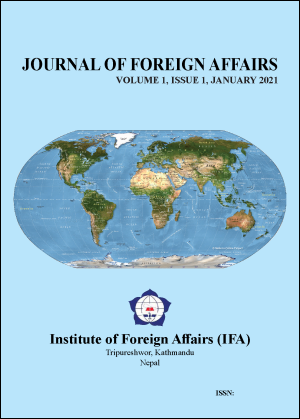Economic Diplomacy for Development Partnership
DOI:
https://doi.org/10.3126/jofa.v1i1.36249Keywords:
Economic Diplomacy, Nepal, Strategies, State Actors, Non-state actorsAbstract
The turn of events after the end of the Cold War called for revisiting traditional approaches to foreign policy. Shift in the world order triggered by enhanced economic activities in the national, regional and international markets has increased the need for coordinated economic diplomacy. Nepal, after the restoration of democracy in 1990, attempted to institutionalise and practise economic diplomacy through the Ministry of Foreign Affairs and its overseas missions. Exploring the leading features of economic diplomacy, this study revisits the economic diplomacy experiences of Nepal. Underscoring how a country’s development success, in the globalised era, depends on the application of new skills and tactfulness in the conduct of relations by the lead ministry in the government, this paper internalises the importance of more competent and robust strategies to enhance the spirit of coordinated economic diplomacy. Hypothesising that Nepal has huge potential for development and economic growth, and prospects to conduct coordinated economic diplomacy, the study recommends strategies to strengthen coordinated economic diplomacy as a tool to advance Nepal’s economic, political and strategic interests.
Downloads
Downloads
Published
How to Cite
Issue
Section
License
© Institute of Foreign Affairs

